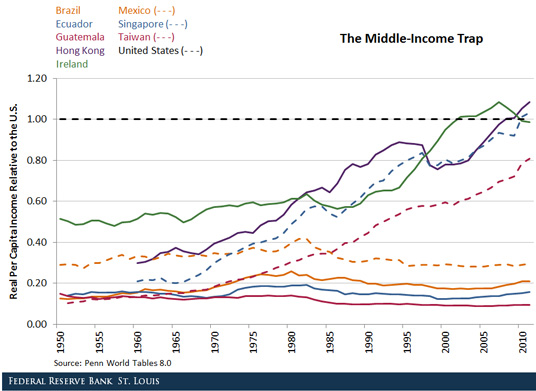International development experts often write about a “middle-income trap.”
According to this theory, it’s not that challenging for nations to climb out of poverty,  but it’s difficult for them to take the next step and become rich countries.
but it’s difficult for them to take the next step and become rich countries.
The theory makes sense to many people because it describes much of what we see in the real world.
We even see the trap at higher levels of income. European nations were catching up with the United States after World War II, but then the convergence process stalled.
But I don’t think there’s actually a “middle-income trap.” Instead, nations don’t enjoy full convergence because they are hamstrung by bad policy.
And Hong Kong and Singapore are the best evidence for my hypothesis. These two jurisdictions have routinely ranked #1 and #2 for economic freedom.
And their solid track record of free markets and small government has paid big dividends. Here a chart, for Our World in Data, which shows how they have fully converged with the United States after starting way behind.
The performance of Hong Kong and Singapore is particularly impressive because the United States historically has been a top-10 nation for economic liberty (notwithstanding all my grousing about bad policy in America, we’ve been fairly good compared to the rest of the world).
So it takes extraordinarily good performance to catch up.
But it can happen.
P.S. By the way, one thing I noticed in the above chart is that Singapore has surpassed Hong Kong in the past couple of decades. This could just be a statistical blip, though I wonder if this is a result of the transfer of Hong Kong from British control to Chinese control. Yes, China has wisely chosen not to interfere with Hong Kong’s domestic policy, but perhaps investors and entrepreneurs don’t fully trust that this economic autonomy will continue.
P.P.S. Don’t forget that comparatively rich nations can de-converge if they adopt bad policy.
